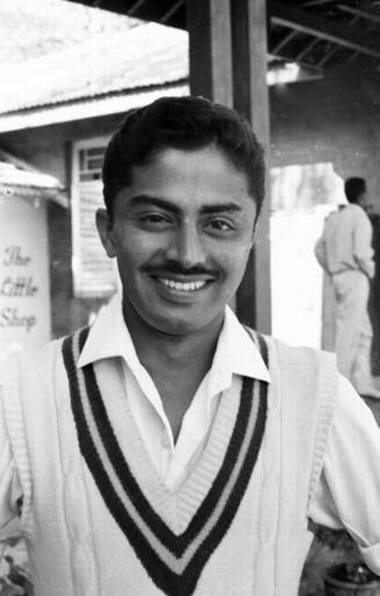Registered with the Registrar of Newspapers for India under R.N.I 53640/91
Vol. XXIX No. 24, April 1-15, 2020
Remembering P.K. Belliappa
V. RAMNARAYAN

“You got me into trouble with my family, Ram,” he complained to me nearly two decades ago, but his warm smile and the twinkle in his eyes suggested he was not really upset with me for having described him as a ladies’ man in my book on Tamil Nadu cricket. Patamada Karambiah Belliappa, who died in Bengaluru on 19th February barely a month short of his eightieth birthday, might have been the envy of young cricketers of my generation for his good looks and charm, but he was much more than that — he was one of the finest cricketers of the state and a popular captain of Jolly Rovers Cricket Club and the Tamil Nadu cricket team from around 1966 to 1973 when he played his last Ranji match.
“Good morning Mr. Chinmayananda,” my father would address my cousin with a prominent jawline, who would retort with “Yes Mr. Belliappa,” aimimg a barb at Father’s expanding avoirdupois. I cannot help remembering the irony of this playful exchange nearly sixty years ago, every time I think of Belli — as the diminutive wicketkeeper-batsman was known in the cricket world — slim and elegant as he was throughout his playing days. In fact, he was the cynosure of all eyes, appearing dapper as ever while being felicitated at a Jolly Rovers reunion in July 2015, along with the other members of the iconic team he had first led in the 1966-67 season to the first division title, followed by many more such triumphs in the Madras cricket league in the years to come. Only a touch of grey hair betrayed his 75 years then; he looked smart and trim that evening as he had in front of and behind the stumps for Loyola College, Jolly Rovers and Madras in the summer of his youth. He accumulated his 4000 plus runs in first class cricket by steady application, craft and intelligence rather than extravagant artistry or fireworks. He likewise collected more than a hundred victims caught or stumped with unfussy efficiency without attempting anything flashy.
I had a taste of his batting skills — at my expense — during a practice game at Chepauk in the late 1960s, when I troubled him with my off-spin for nearly 45 minutes, before losing my patience and feeding him a couple of half volleys, which he promptly despatched to the boundary. My captain V.V. Kumar came up to me and said, “Never give easy runs to a batsman; when you have him under your control, just strangle him. A player of Belli’s class needs only a sniff of a chance, no matter how defensive he may look.”
Belliappa made a quiet Ranji Trophy debut in the 1959-60 season when Madras was led by C.D. Gopinath, and later played under the captaincy of A.G. Kripal Singh, Test cricketers and outstanding batsmen both, before he was elevated to the captaincy in the 1966-67 season. He later made way for S. Venkataraghavan who was being groomed for the Indian vice captaincy as Ajit Wadekar’s deputy, and played under the off spinner for a couple of seasons more.
Belliappa’s best years as an opening batsman were marked by a successful partnership with the fleet footed K.R. Rajagopal when the pair dominated league cricket and made entertaining runs for the state. The attacking Rajagopal was himself considered unlucky to miss selection to the 1968 tour of Australia under M.A.K. Pataudi’s leadership despite scoring nearly 800 runs in the Ranji season preceding that tour. Rajagopal was also a brilliant wicket keeper, but it was his captain Belliappa who did duty behind the stumps for Madras. Originally from Bangalore, Raja played for both his home state and Madras.
Belliappa scored four first class hundreds in an era when centuries were relatively rare. One of them, 104 for South Zone against the Mike Smith-led Marylebone Cricket Club did not earn him a place in the Indian team, but if Belli was hurt by selectorial rejection, he never showed it by word or deed. He continued to soldier on for state and club for nearly ten more years until he called it a day at age 33 in the 1973-74 season.
After his playing days Belli moved to Canada, returning to India in the recent past. He is survived by his wife, a daughter and a son.


Sir, P K Belliappa was one of the most deserving cricketers who should have played for India. A magnificient wicket keeper and an attacking opening batsman, he was simply a delight to watch. Belliappa and K R Rajagopal were an awesome duo who provided firepower at the top of the order. Belliappa may not be with us but his deeds in the cricketing field will live for ever.